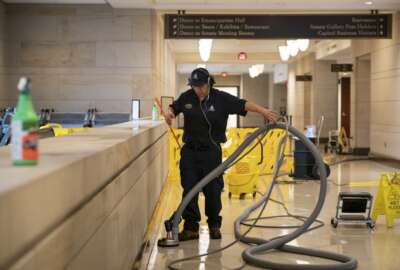To listen to the Federal Newscast on your phone or mobile device, subscribe in PodcastOne or Apple Podcasts. The best listening experience on desktop can be found using Chrome, Firefox or Safari.
- The Pentagon’s top financial official is resigning. Elaine McCusker, DoD’s acting comptroller and chief financial officer will step down on June 26. President Trump had nominated McCusker for the permanent comptroller position last year, but revoked that nomination in March. That was after public reporting indicated she had pushed back against the White House’s attempt to withhold defense aid from Ukraine, a central issue in the president’s impeachment trial. McCusker is currently the deputy DoD comptroller, and her departure will leave the office with no Senate-confirmed officials. DoD did not immediately respond to questions about who will lead the office after she departs next week. (Department of Defense)
- Vice Adm. Jeffrey Trussler was selected as the next director of naval intelligence. He will also work as the deputy chief of staff of naval operations for information warfare. Trussler formerly served as the commander of the Undersea Warfighting Development Center and as the director of future place on the Navy staff. Trussler takes over for Vice Admiral Matthew Kohler, who served in the director of intelligence position since 2018. (Department of Defense)
- Authorities have charged an active duty Air Force sergeant with murdering a Federal Protective Service officer in Oakland last month. Staff Sgt. Steven Carrillo was already in jail for the separate killing of a sheriff’s deputy on the California coast. Federal prosecutors say in the Oakland case, he fired an AR-15 rifle into a guard station outside the Oakland federal building, killing officer David Patrick Underwood and wounding one of his colleagues. Authorities claim Carrillo was connected to a right-wing anti-government movement, and the group came up with the plan to target law enforcement officers during recent protests via online chats. (Federal News Network)
- Three companies are entering the “show me” portion of the competition to build an application to make it easier for military service members to transition to civilian life. The Labor Department announced Eightfold, LinkedIn and Square Peg Hires will present their software applications to transitioning service members from various Army installations through virtual Transition Assistance Program courses. The service members will evaluate their user experience and provide feedback as part of the competitive review process. The winning company will receive $300,000 for the final phase of the competition where they will demonstrate job matching capabilities.
- As protests continue across the nation, Congress is looking at how the military addresses race as well. The military’s top judicial leaders had few answers for why there were racial disparities in the punishment of minority service members compared to white ones. Officials told the Congress they are just beginning to change the way they look at racial data and the causes for the disparities as mandated by new laws. The consensus is that minorities are prosecuted at higher rates when at the E-5 level or below. Lawmakers were frustrated by the lack of initiative by the military considering the problem has been well documented for years. (Federal News Network)
- Another Department of Homeland Security subcomponent faces a budget shortfall because of the pandemic. The National Treasury Employees Union says declining trade and travel volume is opening up a partial funding shortfall at the Customs and Border Protection Office of Field Operations. The CBP field office may be short $400 million by the end of the fiscal year. Customs and immigration user fees account for 40% of the CBP office’s budget and the salaries for 8,000 CBP officers. NTEU National President Tony Reardon urged Congress to appropriate additional funding for CBP to avoid the prospect of employee furloughs. (Federal News Network)
- The Small Business Administration opened up a new round of disaster loans, with different rules. With $60 billion in new money to loan, the SBA refreshes its Economic Injury Disaster Loan portal. The low interest, long-term loans are available to small businesses and non-profit organizations affected by the pandemic. The advance component provides thousand-dollar-per-employee grants for immediate relief. Washington, D.C. economist William Michael Cunningham says revised rules make loans more available to gig workers, free-lancers and contract employees.
- Maximum telework continues indefinitely at the Social Security Administration. SSA Commissioner Andrew Saul told employees in an email that the agency is working to acquire masks, hand sanitizer and other supplies. He says SSA is still assessing how it will keep vulnerable populations without phone or internet access and its employees safe at agency field offices. Saul acknowledged employees are likely looking for more information about SSA’s status and its own reopening plans.
- One Senator says exempting the intelligence community from federal cybersecurity requirements was a mistake. Sen. Ron Wyden (D-Ore.) is pressing the Director of National Intelligence John Ratcliffe for new details on how the intelligence community agencies are securing their systems and data. The Oregon Democrat writes to Ratcliffe after releasing an unclassified version of a new report detailing how the CIA lost hacking tools. Wyden wants answers to four questions about how the IC has implemented multi-factor authentication on government domains, how the IC is using email security tools known as DMARC and the IC’s progress in adopting the 22 cyber recommendations from its inspector general. Wyden asks for answers by July 17.
- The Equal Employment Opportunity Commission has some ideas on how agencies can better handle conflict of interest cases. Having agencies clearly define what conflicts of interest actually are is a start. EEOC says complainants often misinterpret the meaning and spend time filing conflicts of interest complaints when they should pursue another avenue instead. The commission also recommended agencies sign memos of understanding with their subcomponents and other organizations who can mutually agree to process each other’s cases.
- Democrats in the House and Senate introduced a bill aimed at protecting whistleblowers at organizations that receive coronavirus relief spending. The COVID-19 Whistleblower Protection Act would give the Labor Department the authority to investigate retaliation claims from non-federal employees or contractors who report fraud waste or abuse. The legislation would also give non-federal whistleblowers access to jury trials in federal court if administrative efforts don’t come through in a timely manner.
- The General Services Administration specified what cleaning federal buildings will need once they reopen. GSA is modifying its janitorial services contracts for federally owned buildings. It will also issue unilateral lease amendments to the owners of more than 8,000 federal-leased office spaces starting Friday. The new language requires lessors to wipe down all high-contact surfaces in common and high-traffic areas at least once a day. GSA will require lessors to clean the surfaces first with soap and water, followed by a disinfectant from a list of EPA-approved products. (Federal News Network)
Copyright
© 2025 Federal News Network. All rights reserved. This website is not intended for users located within the European Economic Area.



